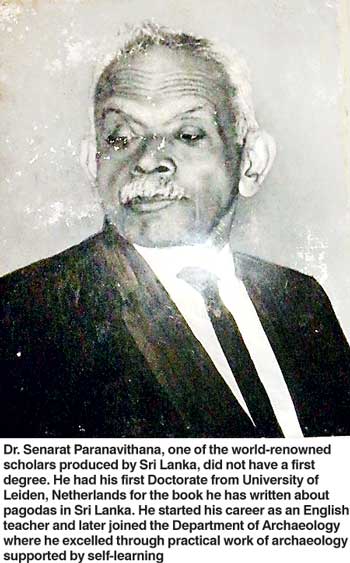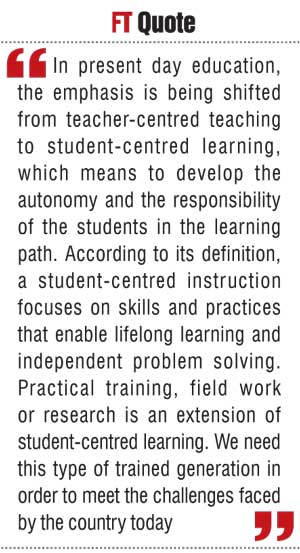Saturday Feb 14, 2026
Saturday Feb 14, 2026
Wednesday, 17 June 2015 00:00 - - {{hitsCtrl.values.hits}}
There is a constant complaint by private sector organisations that the graduates produced by the educational institutions do not have the necessary attributes they expect. In addition to the appropriate educational background and attitudes, graduates sometimes are not equipped with required training.
It is argued that the universities should produce academics and not technocrats and the task of the universities is to equip the students with knowledge rather than training them for employment. Out of the university students, a certain percentage will engage in further education and a certain percentage may want to seek employment once they are graduated. Even a student who wants to pursue the academic line should be engaged in research or field work, which is a form of practical application of the knowledge gathered.

Knowledge
Knowledge comprises of theoretical as well as practical sides. In order to be successful, one need to understand both. That is why there are internships and summer jobs in the Western world. No one can survive in any career if results are not brought in and practical knowledge helps one to do that.
Theory teaches the concepts to the students with the experience of the others and the practical training teaches the student the application of the theory with the own experience of the student. Theory is thought in an ideal of a vacuum where as practical can be learnt through the reality of life.
Practical experience
Unlike the academic courses, the professional courses very often require practical experience. The writer has firsthand information about practical training scheme implemented by the Institute of Chartered Accountants of Sri Lanka (CA Sri Lanka).
Practical training is an essential and integral part of the course offered by CA Sri Lanka. Present syllabus of CA Sri Lanka has three levels Executive Level, Business level and Corporate Level and the students have to cover one year comprising of minimum of 220 days practical training/ field work at each level.
Once they complete knowledge modules and skill modules applicable to each level together with required practical training they can leave the system if they so wis
h after completing Executive Level as Certified Business Accountants; after completing Business level as Senior Certified Business Accountants; and finally after completing Corporate Level as Chartered Accountants.
At each Level the Accountants should be competent enough to apply the knowledge and skills he/she gathered in whatever the job which fit into his/her qualification. Practical experience is the key which empower the Accountant with the ability to deliver. Therefore CA Sri Lanka has put much emphasis in practical training.
Leave alone the professional accounting bodies even the universities which offer academic commerce and management degrees today require their students to work as interns, either at audit firms or commercial establishments.
Practical training
CA Sri Lanka also has extended practical training to commercial establishments as well for a long time so that the students so wish can join those approved commercial establishments. Hence CA Sri Lanka has given the students the option to select an organisation after considering all the factors important to him/her and what is on offer by these categories of organisations.
It is not mandatory to join an audit firm to do practical training other than final two years if they wish to practice. The students who learn relevant knowledge modules apply such knowledge during the practical training. This includes from identifying primary documents and ledgers where the transactions are entered; and learning how to deal with clients/ superiors and fellow workers; to applying complicated accounting standards in preparation of accounts to be published.
This moulds the students to be fit enough to engage in a profession which carries not only a liability towards the respective clients but also a public liability in general. In order to ensure the quality of the products CA Sri Lanka decided to impose those rules.

Trainees
Based on the rigid training offered, in good old days under the articled clerk system those trainees had to pay to the audit firm where they got training. The system has evolved and presently an allowance is paid to the trainees.
Allowances specified by CA Sri Lanka is the minimum allowances in order to ensure that no entity pay lesser than that. However capable students get more than the minimum allowance and it can be negotiated.
Under the practical training scheme the students are entitled to get minimum number of paid study leave days in addition to and much more than their normal leave entitlement so that this enhances the financial value of the allowance.
An organisation that gives this full quota of this study leave will not have this trainee working for a significant number of days in the year. On top of this, leave will be mandatorily given leading to the exam irrespective of the circumstances and the workload during that time at the training organisation.
CA Sri Lanka recognises seven to eight hours per day since the institute does not expect the students to sacrifice studying time for extended work. However extended hours of work which should not be a regular phenomenon paves the way to the students to have firsthand experience in working under stress to meet deadlines which is a common factor in modern business.
This training ensures a trainee immediately on qualifying is provided the knowledge and skill to perform the job of a fully-fledged accountant earning a good salary for which the efforts, resources employed, and time during training is rewarded handsomely. Hence the training to be provided by these training institutions are specified by the institute to ensure the qualified accountant professional is a well-rounded personality having the required management, interpersonal, and soft skills.
Student-centred learning
Dr. Senarat Paranavithana, one of the world-renowned scholars produced by Sri Lanka, did not have a first degree. He had his first Doctorate from University of Leiden, Netherlands for the book he has written about pagodas in Sri Lanka. He started his career as an English teacher and later joined the Department of Archaeology where he excelled through practical work of archaeology supported by self-learning.
In present day education, the emphasis is being shifted from teacher-centred teaching to student-centred learning, which means to develop the autonomy and the responsibility of the students in the learning path.
According to its definition, a student-centred instruction focuses on skills and practices that enable lifelong learning and independent problem solving. Practical training, field work or research is an extension of student-centred learning. We need this type of trained generation in order to meet the challenges faced by the country today.
(The writer is a Chartered Accountant by profession and holds a Master of Business Administration degree awarded by the Postgraduate Institute of Management of University of Sri Jayewardenepura.)